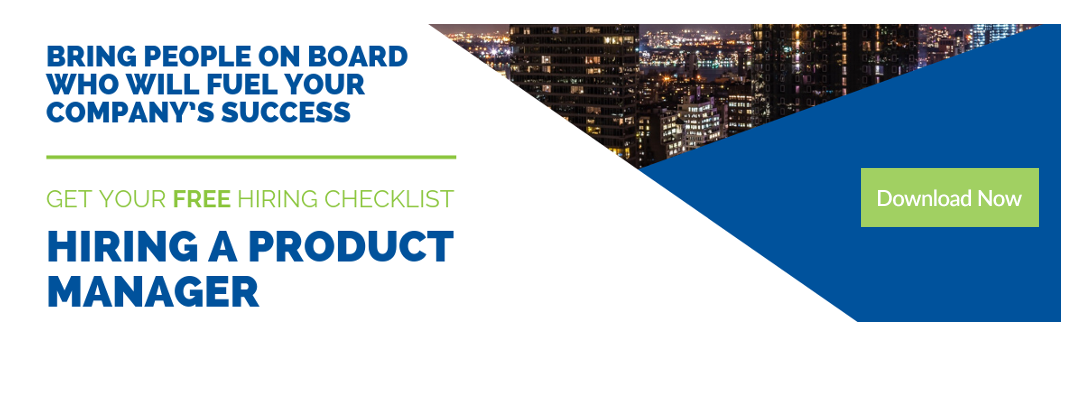I completed my first search for a Product Manager in 2006. Since then, product has become a much bigger deal, overtaking sales as the primary reason why a company will succeed or fail. It’s been a fascinating transition, not only to watch, but to be a part of, as we’ve ramped up our product management recruiting practice to keep pace with demand.
It’s amazing how quickly an idea can become a prototype, then a minimum viable product (MVP), and then a finished product that customers love. It’s been humbling to be trusted by our clients to help them make these incredibly strategic hires—bringing in the people who develop the product roadmap from idea to revenue.
I’ve also seen first hand how challenging it can be for organizations to build their product teams.
The biggest difference I’ve noticed between companies who are able to successfully build their product management team, and companies whose searches drag on for a long time, is whether or not the company is in a position of readiness.
Here are 3 steps to take before you start recruiting a new product manager, to make sure that your organization is ready:
1. Forget the Job Description—Get Your List of Requirements Ready!
Job Descriptions are a holistic picture of what a role will be responsible for. They can easily get bloated with baseline requirements, like “great communication skills,” or “able to work well with a team.” These are the kinds of things that you can screen for in the interview process. Instead, begin by listing the specific requirements and past experience you consider important in the candidate you want to hire.
Most likely this will be a very short list of bullet points—this list will give your recruiter a very targeted profile to seek out. For example, during one of our recent requirement calls with a retained client, we were able to boil down their job description into three key requirement they wanted all candidates to have:
- Experience launching a hardware and software product (i.e. IoT, robotics, wearables, etc.)
- Experience managing a team of product managers
- Experience launching a product internationally with a global footprint
This list helps us conduct a very targeted search, contacting everyone in the market who might be a good fit—who we then pre-qualify through interviews and resume reviews, in order to present a short list of the very best candidates to our clients.
To help you develop your list of requirements, think about the scope of release experience you want a candidate to have. Our experience recruiting Toronto product managers has taught us that release experience is a much clearer indicator of a candidate’s ability than the number of years they’ve been a product manager. I’ve interviewed many candidates with five years of experience who have not accomplished nearly as much as some who have only been at it for three years.
While you’re gathering your requirements, ask yourself how important it is for a candidate to have subject matter expertise. If you truly need a candidate with direct experience in your industry and niche, that will likely slow down your search and give you a smaller pool of candidates to work with. Are you ok with that? Do you have others already in your organization who can function as subject matter experts when needed?
Our experience has taught us that many of the best product managers change products and industries often throughout their careers. We’ve also seen that many product managers are motivated by the ability to learn, solve new problems, and add new skills to their toolbox when they are pursuing new opportunities—so be clear about how much flexibility you have around subject matter expertise.
2. Get Your Interview Process Ready!
Before you begin the search, plan your interview process. How many rounds of interviews will you do, and who will they be with? Then, ask yourself why you decided on that many steps, and why those people need to be involved—are there extra steps that can be eliminated? How does each step and person involved work toward qualifying and confirming that the candidate has the experience you need?
When engaging a firm to execute the search, what role will your internal HR/Recruiter play? If your internal recruiter/HR resource is a generalist who does not understand the product manager function, do you really need them doing an initial phone screen? Avoid duplication of the search firm’s work; create efficiencies and remove roadblocks wherever possible.
Next: will there be an assignment component to the interview process? In recent years we’ve seen these become the default for hiring, and there is growing animosity in the design and product manager communities for take home assignments as part of the interview process.
Before assigning work to a candidate, make sure that you are crystal clear on the outcome you want, and that the assignment itself is designed to evaluate the right skills. Do you need to see solid presentation skills? Ask your candidate to come in and do a 10 minute talk on any subject they are knowledgeable about, instead of asking them to generate a whole new presentation. Are you looking to get a sense of their thought process when presented with a new problem? Instead of assigning a take-home case study, turn one of your interviews into a white-boarding session to work through an abstract problem with relevant team members.
If you absolutely need an assignment in your process, limit them to finalists. Don’t be the employer who asks multiple candidates to compete over an assignment to see who makes it to the final round. Make it the final step with the candidate you want to hire.
Lastly, get ready to adjust your process if the need arises:
- Will any key team members be travelling when they’ll be needed for interviews?
- Are video interviews possible? Zoom? GoogleMeets? Skype?
- How will you handle scheduling? Who will be in charge of booking and confirming meetings?
- Will you be ready to fast-track a promising candidate if they are far along with other employers?
- How much flexibility does your budget have for the right person?
Establishing your baseline process before you get started will allow you to adjust and refine while you’re in the thick of it. Most importantly, make sure you’re setting up a process reflective of the fact that it’s a candidate’s market.
3. Get Ready to Sell!
Throughout all the ups and downs of the last year, one thing is certain: it continues to be a candidate’s market. Are you ready to sell your mission and vision to a candidate to make them excited to work for you?
What is the story your new product manager will become part of? What problem does your software solve, and how does it add value to your customers? What do your customers love about your product? What is it about the role that will inspire someone to say “no thank you” to a competing opportunity or job offer and come to work for your organization? Get excited about communicating this to candidates.
Remember that people are a big part of what makes people excited to go to work, so don’t forget to highlight your people! Be ready with stories about how a key team member made a difference to a customer, how the senior leadership team lives the company values, and how a team member was recently promoted for great work. These stories help your product management candidates buy in to your organization and the experience of working with you. Help them get excited!
It’s a candidate’s market, which means that organizations who want to attract and hire the top product talent need to be ready to handle the challenges that recruiting product managers entails.
During the 13 years we’ve been recruiting product managers for our clients, we’ve seen many organizations successfully scale their product teams and go on to build some incredible things. Unfortunately, we’ve also seen companies miss out on hiring amazing product managers because they were focused on the number of years a candidate’s been in the role despite an extraordinary amount of release experience, because they weren’t willing to adjust a lengthy interview process or insisted on making an in-depth assignment part of the evaluation, or because they assumed that every candidate would instinctively want to work for their company.
By embracing a position of readiness, you can avoid some of these challenges, and get your new product manager contributing to your business right away.

